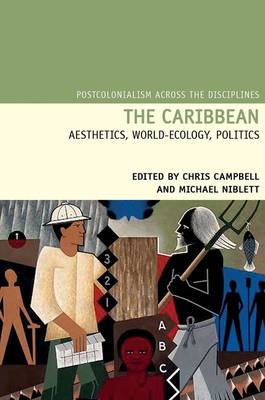
- Retrait gratuit dans votre magasin Club
- 7.000.000 titres dans notre catalogue
- Payer en toute sécurité
- Toujours un magasin près de chez vous
- Retrait gratuit dans votre magasin Club
- 7.000.0000 titres dans notre catalogue
- Payer en toute sécurité
- Toujours un magasin près de chez vous
The Caribbean
Aesthetics, World-Ecology, Politics
254,45 €
+ 508 points
Description
Bringing together the work of literary critics, social scientists, activists, and creative writers, this edited collection explores the complex relationships between environmental change, political struggle, and cultural production in the Caribbean. It ranges across the archipelago, with essays covering such topics as the literary representation of tropical storms and hurricanes, the cultural fallout from the Haitian earthquake of 2010, struggles over the rainforest in Guyana, and the role of colonial travel narratives in the reorganization of landscapes. The collection marks an important contribution to the fields of Caribbean studies, postcolonial studies, and ecocriticism. Through its deployment of the concept of 'world-ecology', it offers up a new angle of vision on the interconnections between aesthetics, ecology, and politics. The volume seeks to grasp these categories not as discrete (if overlapping) entities, but rather as differentiated moments within a single historical process. The 'social' changes through which the Caribbean has developed have always involved changes in the relationship between humans and the rest of nature; and these changes have long been entangled with the emergence of new kinds of cultural production. The contributors to this collection provide a series of unique insights into the relationship between aesthetic practice and specific ecological processes and pressure-points in the region. More than ever Caribbean writers and artists are engaging explicitly with environmental concerns in their work; this volume responds to that trend by bringing literary and cultural criticism into sustained dialogue with debates around local, national, and regional ecological issues.
Spécifications
Parties prenantes
- Editeur:
Contenu
- Nombre de pages :
- 240
- Langue:
- Anglais
- Collection :
- Tome:
- n° 18
Caractéristiques
- EAN:
- 9781781382950
- Date de parution :
- 13-05-16
- Format:
- Livre relié
- Format numérique:
- Genaaid
- Dimensions :
- 155 mm x 236 mm
- Poids :
- 453 g

Les avis
Nous publions uniquement les avis qui respectent les conditions requises. Consultez nos conditions pour les avis.





